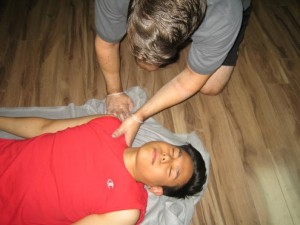It is necessary to recognize medical emergencies at all times. The

earlier the recognition of medical emergencies, the better the chances of better outcome and reducing risks of the injury or damage from aggravating. These medical emergencies can occur any place, any time, thus it is highly advised to enrol in First Aid Courses to be prepared for any type of medical emergency.
Indicators of Medical Emergencies
Recognizing these indicators of medical emergencies as soon as they appear can help guide the rescuer in taking appropriate next steps in a timely fashion. The following are the common indicators that can greatly help in recognizing medical emergencies:
- Difficulty breathing or shortness of breath
- Chest or upper abdominal pain or pressure that lasts for two minutes or more
- Sudden, severe pain
- Seizures
- Swallowing poisonous substances
- Possible serious bone fractures or joint dislocation
- Major burn
- Bleeding that does not stop or cannot be controlled
- Deep, large wounds
- Animal bites
- Coughing or vomiting blood
- Severe or persistent vomiting and/ or diarrhoea
- Changes in vision
- Difficulty speaking
- Confusion or altered state of mind, unusual behaviour
- Loss of consciousness, fainting, sudden dizziness, weakness
- Loss of coordination or difficulty walking
- Symptoms of shock
- Suicidal or homicidal feelings
How to Be Prepared for a Medical Emergency
Some of the common tips in preparing for any potential medical emergency include:
- Determine the location and decide the fastest route to the nearest emergency department before an emergency can occur.
- Keep a list of the emergency phone numbers near the phone. All members of the family and in the household, even children, should be aware of when and how to call these numbers. These numbers should include:
- Local emergency number
- Police department
- Fire department
- Poison control centre
- Doctor’s phone numbers
- Contact numbers of nearby relatives, friends or neighbours
- Work phone numbers
- If one has a chronic condition, wear a medical identification tag.
- If one lives alone, get a personal emergency response team.
What to do In Cases of Medical Emergencies
Most people panic when a medical emergency arises, but it is important to stay calm at all times. In case of a medical emergency, do the following.
- Call the local emergency number
- Initiate CPR or rescue breathing, if necessary and if one knows proper administration.
- Place semiconscious or unconscious persons in the recovery position until the paramedics arrive. Avoid moving the person unless necessary, especially if there is a suspected head or neck injury.
Most medical emergencies catch the patient and the people around them in a surprise. Being prepared for a medical emergency can help in recognizing potential emergency scenarios. As previously mentioned, taking First Aid Training and CPR Courses can help prepare individuals for medical emergencies. Recognizing medical emergencies can help reduce the extent of damage and more importantly, decrease chances of fatalities.
Online Sources:
- http://www.nlm.nih.gov/medlineplus/ency/article/001927.htm
- http://readynutrition.com/resources/recognizing-signs-on-a-medical-emergency_11082011/
